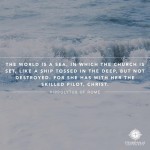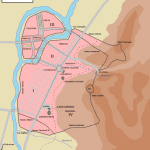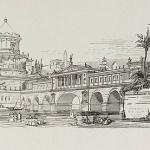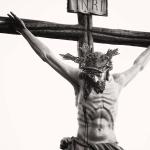1.
It's the feast of the Nativity of St. John the Baptist. 6 months till Christmas! The Church sets this feast based on Luke 1:36.
— Matt Swaim (@mattswaim) June 24, 2015
2. From Pope Benedict XVI in 2012:
Today, 24 June, we are celebrating the Solemnity of St John the Baptist. He is the only saint — with the exception of the Virgin Mary — whose birth the liturgy celebrates and it does so because it is closely connected with the mystery of the Incarnation of the Son of God. In fact, from the time when he was in his mother’s womb John was the precursor of Jesus: the Angel announced to Mary his miraculous conception as a sign that “nothing is impossible to God” (Lk 1:37), six months before the great miracle that brings us salvation, God’s union with man brought about by the Holy Spirit. The four Gospels place great emphasis on the figure of John the Baptist, the prophet who concludes the Old Testament and inaugurates the New, by identifying Jesus of Nazareth as the Messiah, the Anointed One of the Lord. In fact, Jesus himself was to speak of John in these terms: “This is he of whom it is written ‘Behold I send my messenger before your face, / who shall prepare your way before you. Truly I say to you, among those born of women there has risen no one greater than John the Baptist; yet he who is least in the kingdom of heaven is greater than he!” (Mt 11:10-11).
And also:
When one day Jesus himself came from Nazareth to be baptized, John at first refused but then consented; he saw the Holy Spirit settle on Jesus and heard the voice of the heavenly Father proclaiming him his Son (cf. Mt 3:13-17).
3.
As we celebrate the birth of John the Baptist, we pray that like him the example of our lives may help to point others to Jesus.
— Bishop Burbidge (@BishopBurbidge) June 24, 2015
5. From Thomas à Kempis (of Imitation of Christ fame):
Blessed is he who … devoutly seeks Jesus, not in the body, but in spirit and in truth…
Not only should he seek Jesus but also Jesus’ disciples as well as all who love Jesus and all who patiently bear with life’s adversities for the love of him. Love of Jesus and his friends leads one to … distance oneself from all that is impure and vain….
Diligently seek our Lord Jesus Christ’s precursor, the holy John the Baptist, living hidden in the desert, and on bended knee greet him, asking him most devoutly: “Hail, John, most holy and beloved friend of Jesus, I have heard many good and marvelous things concerning you, about your holy and miraculous birth, how from the time of your youth you lived in strict and holy solitude lest you sin, even slightly, in word or thought.”
Ask him how long he remained alone in the desert, and stay with him as long as it pleases him and time permits. Learn from him what food he ate and what he drank and who ministered to his needs while he was there. Whether his father and mother sent him anything; did they come to see him, or did he go to visit them? Perhaps the holy angle Gabriel sometimes came down and revealed many secret things to him, and did Jesus personally come and strengthen him as it is written in the Gospel, For the hand of the Lord was with him (Lk 1:66).
Whatever be the answer to all this, commit yourself fully to the Holy Spirit, who taught, filled, and guided John, adorned his entire life with virtues and guarded over him – in desert, prison, and chains – and at the end of this life received his souls with the martyr’s palm.
This reflection comes via Magnificat today. Do yourself a favor and subscribe if you do not already. Or send a subscription to a friend. It provides a daily dose of spiritual reading and reflection for even the busiest of people.
6.
On feast of St John the Baptist #PopeFrancis urged youth to look to saint in making courageous choices for good. pic.twitter.com/v6avboxc9r
— Catholic News Svc (@CatholicNewsSvc) June 24, 2015
7.
Today is the Feast Day of John the Baptist. Watch our series to explore his life through art: http://t.co/2UvwWKGX1p pic.twitter.com/O7Pknmx0pQ
— National Gallery (@NationalGallery) June 24, 2015
8. From St. Augustine in the Liturgy of the Hours:
The Church observes the birth of John as a hallowed event. We have no such commemoration for any other fathers; but it is significant that we celebrate the birthdays of John and of Jesus. This day cannot be passed by. And even if my explanation does not match the dignity of the feast, you may still meditate on it with great depth and profit.
John is born of a woman too old for childbirth; Christ was born of a youthful virgin. The news of John’s birth was met with incredulity, and his father was struck dumb. Christ’s birth was believed, and he was conceived through faith.
Such is the topic, as I have presented it, for our inquiry and discussion. But as I said before, if I lack either the time or the ability to study the implications of so profound a mystery, he who speaks within you even when I am not here will teach you better; it is he whom you contemplate with devotion, whom you have welcomed into your hearts, whose temples you have become.
John, then, appears as the boundary between the two testaments, the old and the new. That he is a sort of boundary the Lord himself bears witness, when he speaks of the law and the prophets up until John the Baptist. Thus he represents times past and is the herald of the new era to come. As a representative of the past, he is born of aged parents; as herald of the new, he is declared to be a prophet while still in his mother’s womb. For when yet unborn, he leapt in his mother’s womb at the arrival of blessed Mary. In that womb he had already been designated a prophet, even before he was born; it was revealed that he was to be Christ’s precursor, before they ever saw one another. These are divine happenings, going beyond the limits of our human fraility. Eventually he is born, he receives his name, his father’s tongue is loosened. See how these events reflect reality.
Zechariah is silent and loses his voice until John, the precursor of the Lord, is born and restores his voice. The silence of Zechariah is nothing but the age of prophecy lying hidden, obscured, as it were, and concealed before the preaching of Christ. At John’s arrival, it becomes clear when the one who was being prophesied is about to come. The release of Zechariah’s voice at the birth of John is a parallel to the rending of the veil at Christ’s crucifixion. If John were announcing his own coming, Zechariah’s lips would not have been opened. The tongue is loosened because a voice is born. For when John was preaching the Lord’s coming he was asked: Who are you? And he replied: I am the voice of one crying in the wilderness. The voice is John, but the Lord in the beginning was the Word. John was a voice that lasted only for a time; Christ, the Word in the beginning, is eternal.
9. Fr. Steve Grunow on his birth and also on his beheading.
10.
Mosaic of St John the Baptist from the chapel of Zeno is S. Prassede, Rome
https://t.co/MImYXetEPv
— Fr Lawrence Lew OP (@LawrenceOP) June 23, 2015
PLUS: Okay, the list goes on …
A man was sent from God, whose name was John.
He came to testify to the light, to prepare a people fit for the Lord. #Mass #feastday
— Fr. Patrick Brennan (@Pathound) June 24, 2015
















